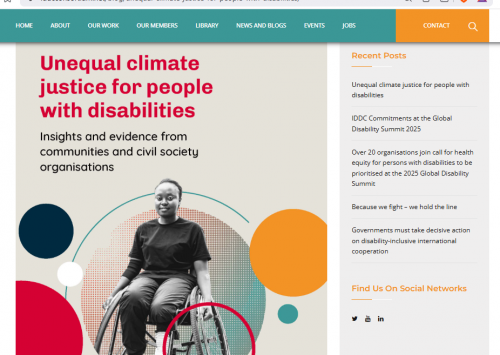
https://www.iddcconsortium.net/blog/unequal-climate-justice-for-people-w...
By harnessing and unpacking data already gathered by the disability community and civil society organisations, this report offers deeper understanding and insights of the diverse experiences of people with
disabilities in the context of the climate crisis; while also providing actionable recommendations. Insights provided in this report can be used by governments, donors and others involved in the response to the climate crisis to enhance climate justice.
Evidence
Data and insights analysed in this report came from responses to a survey from 24 organisations, which were complemented by a desk review of 23 other resources, presenting research findings and programme experiences. This evidence base represents the input of 32 organisations from more than 38 countries across the ‘Global South’.
Impact
Overwhelmingly, the data provides evidence that the climate crisis is worsening existing inequalities. People with disabilities have been negatively impacted by the climate crisis, which is also exacerbating barriers and challenges that already exist. During climate-related disasters, heightened risk is experienced by these groups due to widespread inaccessibility to infrastructure, transportation, early warning systems and
emergency procedures. The impacts of the climate crisis affect every aspect of daily life for people with disabilities, as well as their families, households and communities. This includes lack of nutritious food and safe water, physical and mental health provision, access to education and adequate housing, alongside appropriate standards of living and social protection systems. All are critical for strengthening economic stability and climate resilience, but governments continually fail to recognise, adequately accommodate and consider people with disabilities in their climate change responses to secure these basic needs.
Insights
The data shows that tailoring solutions to both geographic and climate conditions, as well as considering the social, economic and demographic characteristics of local residents (including people with disabilities),
will ensure lasting, impactful mitigation measures, adaptation and nature-based solutions. People with disabilities benefit from programmes to protect, restore or preserve their living environment, when recognised among the targeted local communities, and alongside other wider societal groups. The value of participation and localisation efforts to prioritise context- and community-led solutions cannot be overstated.
Essential components
To realise disability inclusion, five essential, but often-neglected, areas must be addressed:
- Quantitative and qualitative data: Qualitative data exists but robust quantitative data is scarce, often lacking depth and disaggregation to fully capture the barriers, risks and impacts that people with disabilities face.
- Accessibility and reasonable accommodation: Access to physical infrastructure, transportation, information and communication is lacking and requires vast improvement.
- Sensitisation and capacity strengthening of disability organisations: Greater value and emphasis is needed in joint learning and strengthening of knowledge and capacity of OPDs and disability activists, together with all stakeholders engaged in climate action and response.
- Collaboration, partnership and participation of people with disabilities: The contributing role of people with disabilities and their inherent and specific knowledge is rarely acknowledged or valued. This must change.
- Governance, budget and advocacy: Recognition as rights-holders and agents of change, alongside access to funding, is required as existing international and national climate policies frequently overlook the rights, participation and inclusion of people with disabilities.
Conclusions
- Mitigation measures and adaptation efforts are more effective if they are developed and locally led with the involvement of all key social groups, including people with disabilities.
- Investment is required in strengthening both the knowledge of OPDs and formal partnerships that include OPDs in programme delivery, broader climate policy dialogues, strategic planning and budgetary processes.
- Climate financing could be transformational by using disaster risk reduction and management (DRRM) as an entry point to integrate disability rights into climate justice funding and programmes.
- Evidence and research gaps on disability and the climate crisis persist, including equitable access to energy, the experiences of, and the long-term impacts on, people with disabilities in all their diversity.
- Mainstreaming disability in vocational education and on-the-job training for green jobs and climate-smart agriculture successfully addresses skills shortages and helps to counter stigma and/or exclusion experienced by people with disabilities.
Recommendations
Coordinated action is needed to ensure the health, economic and social impacts of the climate crisis on people with disabilities are addressed, and that their demands are used to move towards equitable climate action.
To strengthen disability inclusion in climate action, and to help prevent inequalities experienced by people with disabilities from deepening, the DDG and IDDC call to governments, donors, INGOs and all climate stakeholders is to:
- Bridge the data gap to identify, address and report inequities experienced by people with disabilities and prioritise advancing disability inclusion across all climate action and responses.
- Accelerate climate financing that includes a focus on disability inclusion and is accessible to disability organisations.
- Prioritise people with disabilities in climate responses and long-term planning, implementation and budgeting.
- Strengthen partnerships and coordination mechanisms to increase the engagement of people with disabilities and/or their representative organisations in climate responses
ABOUT
The International Disability and Development Consortium (IDDC) is a grouping of civil society organisations coming together around a common objective: promoting inclusive international development and humanitarian action with a special focus on the full and effective enjoyment of human rights by all people with disabilities.
In this diversity, we find our strength. Member-driven, our activities are defined and run by members through thematic task groups.Partnership is at the heart of what we do and as well as a dynamic internal collaborations we have built up a trustworthy reputation among disability organisations, donors and experts, many of which are close partners.









